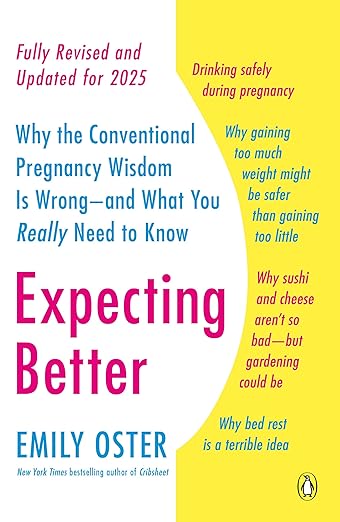
Expecting Better
Expecting Better: Why the Conventional Pregnancy Wisdom Is Wrong–and What You Really Need to Know. By Emily Oster. 328 pages.
When Emily Oster found out she was pregnant, she immediately began researching the best ways to take care of her child in utero. On the internet, there are a lot of opinions and not a lot of data, even among the medical community. For example, she wanted a cup of coffee but didn’t know if it would affect her baby. The Mayo Clinic Guide to a Healthy Pregnancy says no caffeine at all, but What to Expect When You’re Expecting says that up to 200 mg per day is ok. And her sister’s OB/GYN said no more than 300 mg a day. Which rule should she follow? What is the risk of having a cup of coffee each day?
Fortunately, Dr. Oster is a microeconomist - an expert in the science of making decisions. She understands the difference between good and bad studies and how to extract insights from data. Not content to blindly follow the rules her doctor prescribed, she went to the source of the data to make her own decisions.
The product of this research is the book Expecting Better. In each chapter, Dr. Oster explores a common pregnancy question, explains what research has been done on the topic, and the tradeoffs of the decision. In most cases, she avoids judgment, allowing expectant mothers to make their own decisions based on the data and their preferences. The book is written with exactly the right level of detail—enough to explain to a layman how she arrived at her conclusions without getting bogged down in technicalities. Unlike other books on pregnancy, it is witty and candid— Dr. Oster has a self-deprecating style and weaves her personal experiences seamlessly into discussions of medical studies.
Her conclusions often go against common pregnancy wisdom. Take drinking as an example. While the official line is that no alcohol has been shown to be safe during pregnancy, her doctor said 1-3 glasses of wine a week is fine. What does the evidence have to say about it?
There are some obvious consequences to drinking while pregnant. Fetal Alcohol Spectrum Disorders (FASD) are a well-known consequence of drinking while pregnant. But FASD only shows up in infants whose mothers binge drink during their pregnancy (over 5 drinks in a session). In Europe, the restrictions around alcohol and pregnancy are more relaxed, but there is a lower incidence of FASD in infants than in the United States. Americans drink less than Europeans while pregnant, but the ones that do are engaging in harmful binge-drinking behavior rather than having a drink with dinner.
After reviewing the literature, Dr. Oster found that there were no high-quality studies linking light to moderate drinking in pregnancy to IQ loss or behavioral problems. One study actually reported that 1/2 to 1 drink a day was linked to higher IQ, but this is likely due to confounding factors such as education rather than a real cause. While there were studies that found harmful effects from light and moderate drinking, the studies had serious problems, such as mixing mothers who drank and used cocaine into the same group.
This is only one topic she covers in a wonderful book. Other topics covered:
- What are the tradeoffs of prenatal testing?
- How much weight should I gain?
- Will an epidural harm my baby?
- Risks of a Cesarean Section
- What medicines can I take safely?
- What foods should I avoid?
What I got out of the book is that, short of doing things that are obviously wrong (smoking, cocaine, binge drinking, etc.) most of the rules you’re supposed to follow have only minor impacts. Learning about the evidence relaxed me during my wife’s pregnancy, as I didn’t feel like making one mistake would mess up the baby.
Side note: My wife did not like this book, as it is written by an economist and not a medical doctor.